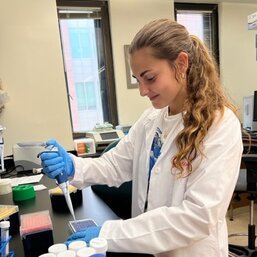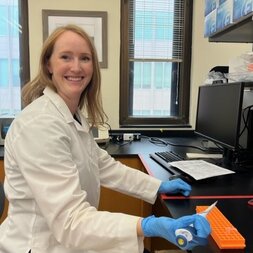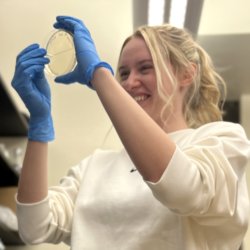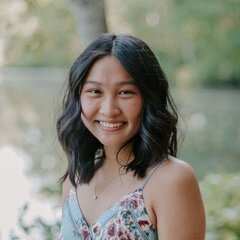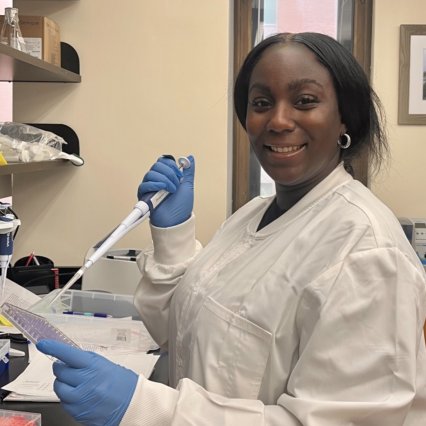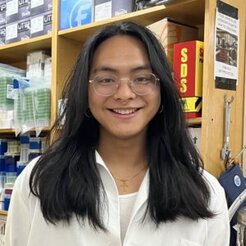Maddi Clark, B.S.Research SpecialistSCIENCE Maddi is investigating cadmium-sequestering metallothionein proteins and evaluating their previously uncharacterized tumor suppressor pathway. She is building off of past research in the Delaney lab that established the role of aneuploid-suppressed autophagy as a targetable vulnerability of ovarian cancer, as metallothionein tumor suppression is also suppressed by aneuploidy. Maddi is working with our newly developed mouse model Trp53em1Jdel_Tg(Ovgp1-Trp53*R270H-Myc) and breeding mice to develop transgenic mice with metallothionein knockdowns to access how metallothionein knockdown contributes to tumor development and chromosomal instability in transgenic mice.
HOBBY Maddi enjoys spending her free time at the beach and exploring the city of Charleston |
Sydney Oesch, M.D.Medical Fellow, Gynecologic OncologySCIENCE Sydney is investigating SUMO E3 ligases and their role in chemotherapy treatment. She is identifying proteins which are SUMOylated during doxorubicin stress. She is performing quality control experiments for E3 ligase knockdown, transfected tagged SUMOylation assays, and tag-SUMO pulldowns.
HOBBY Sydney enjoys cooking new recipies with her husband, attempting to play tennis, attending Orangetheory fitness classes, and playing tug-of-war with her Maltese dog, "Dallas". She looks forward to expanding her family with another Maltese, "Charlie" (for Charleston), soon |
Amy Rees, B.S.Research SpecialistSCIENCE Amy’s research seeks to better understand how autophagy drugs in combination affect subtypes of ovarian cancer as well as other solid tumors in vivo. Our lab-generated bioinformatic software SWAN, when utilized with solid tumor aneuploidy data, predicts many other solid tumors will be sensitive to autophagy combination therapy. Amy is systematically testing these candidate solid tumors in mouse xenograft models, measuring tumor growth and autophagy engagement. Amy’s secondary project involves development of an efficient cytotoxic drug screening platform for cell lines with engineered differential expression of metallothioneins.
HOBBY Amy enjoys volunteering at a local children's hospital and teaching baton twirling classes to bring smiles to young researchers-to-be |
Della EvansUndergraduate Researcher, College of CharlestonSCIENCE Della’s thesis project involves understanding how whole-genome CRISPR-Cas9 screen hits manipulate drug response to the autophagy drugs hydroxychloroquine or nelfinavir mesylate. Della is utilizing western blotting techniques and immunofluorescence microscopy to understand how autophagy and the unfolded protein response become dysregulated once the hit gene is knocked-out in ovarian cancer cell lines.
HOBBY Hiking, baking, and guitar |
Melayshia McFadden, Ph.D.Post-doctoral scholarSCIENCE Melayshia is fulfilling translational projects in the lab related to how metallothioneins do or do not contribute to oncogenesis and drug sensitivity. She is utilizing a transgenic mouse model, the Trp53em1Jdel_Tg(Ovgp1-Trp53*R270H-Myc) mouse generated by the Delaney lab, to assess the timeline and characteristics of gynecologic tumor formation with or without metallothionein genes. Interactions between metallothioneins and copy-number alterations as well as environmental cadmium a research focuses to understand the context of metallothionein alterations. Melayshia is also using bioinformatic methods to determine copy-number alteration profiles associated with demographic groups which may explain poor outcomes in some groups with certain solid tumors.
HOBBY Dancing, singing karaoke, and spending quality time with friends and family |
Evan VillamorUndergraduate Researcher, College of CharlestonSCIENCE Evan is discovering how the autophagy inhibitors hydroxychloroquine and nelfinavir mesylate synergize to kill ovarian cancer cells. He is studying each of three regulatory arms of the unfolded protein response to identify how these drugs coerce normally cytoprotective homeostatic mechanisms into overload, leading to cell death.
HOBBY Evan enjoys doing random arts and crafts projects like bedazzling and painting. He also loves thrifting, taking pictures, window shopping, and watching anime and random movies |
Principal Investigator
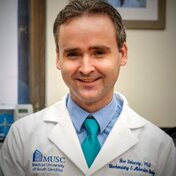
Joe Delaney, Ph.D.
Associate Professor
The Medical University of South Carolina
Department of Biochemistry and Molecular Biology
delaneyj [at ] musc.edu
Associate Professor
The Medical University of South Carolina
Department of Biochemistry and Molecular Biology
delaneyj [at ] musc.edu
Mentoring Philosophy
I am committed to ensuring the pursuit of science helps both the lab and the scientists involved in the research. Important aspects of scientific career building include not only acquiring cutting-edge technical skills, time management ability, and publications, but also being able to apply and obtain fellowships and grants. It is a high priority of mine to foster these pursuits for all levels of trainees: undergraduates to post-docs and beyond.
Team building in science also requires people to treat each other with courtesy and respect. In my lab, there are no dumb questions.
Each person here is mentored in a way which bests matches their personality. Introverts and extroverts are similarly welcome. Underrepresented minorities are strongly encouraged to apply for any open positions; I have mentored people from many backgrounds.
Team building in science also requires people to treat each other with courtesy and respect. In my lab, there are no dumb questions.
Each person here is mentored in a way which bests matches their personality. Introverts and extroverts are similarly welcome. Underrepresented minorities are strongly encouraged to apply for any open positions; I have mentored people from many backgrounds.
Education and Training
|
Duke University
Post-doctoral training Mentor: Al La Spada, M.D., Ph.D. University of California San Diego Post-doctoral training Moores Cancer Center Mentor: Dwayne Stupack, Ph.D. Grant title: “Copy number alterations in low mutation cancer” |
University of Washington
Ph.D. in Molecular and Cellular Biology Mentor: Matt Kaeberlein, Ph.D. Thesis: "Elucidation of the molecular pathways of lifespan extension by dietary restriction in yeast" University of California: Berkeley B.S., Chemical Biology |
